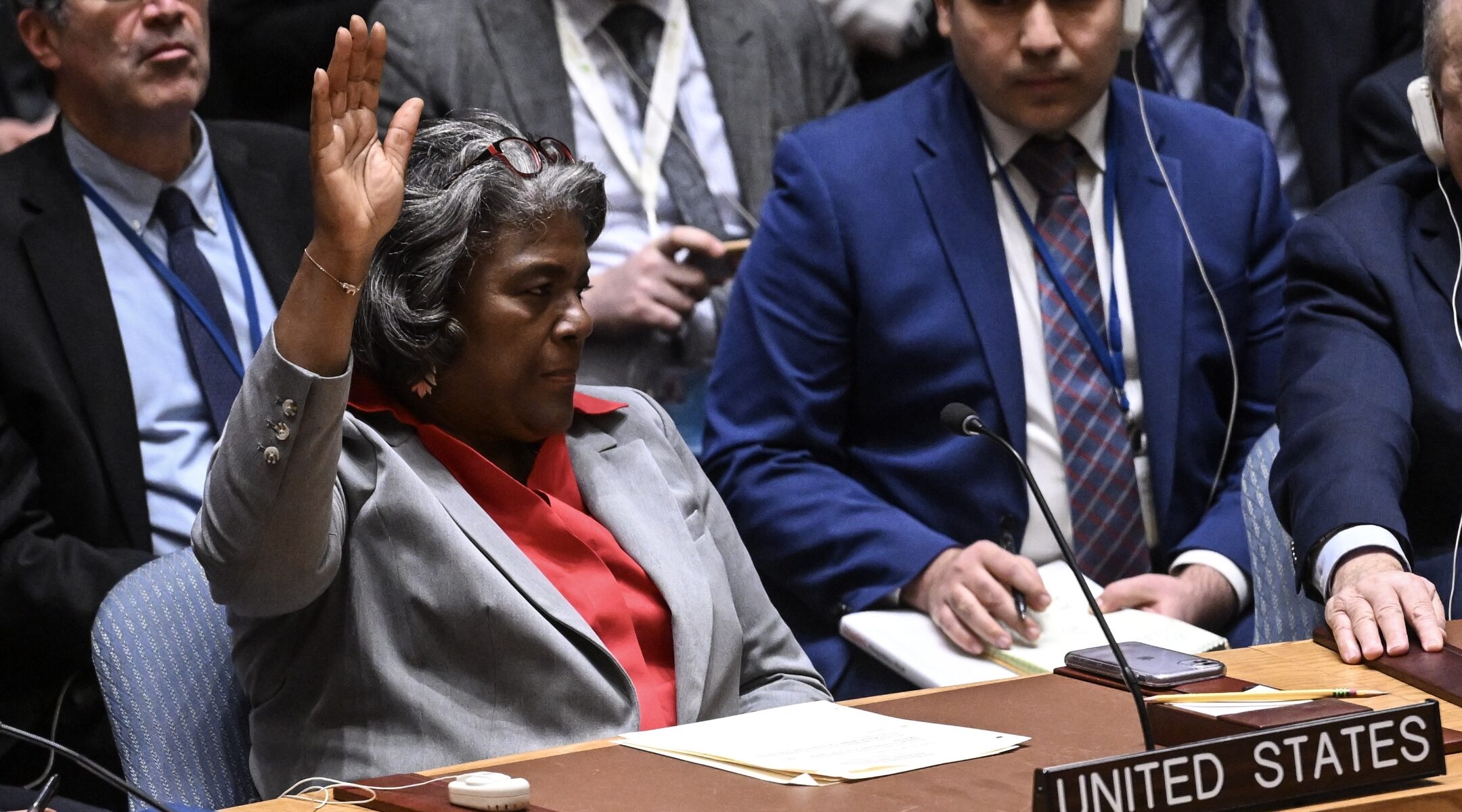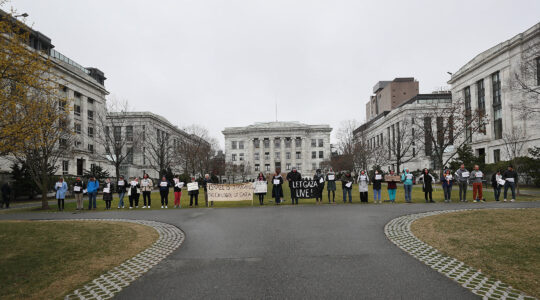WASHINGTON (JTA) — The United States abstained on a United Nations Security Council resolution calling for a ceasefire in the Israel-Hamas war, allowing it to pass — marking the first time that the council has succeeded in issuing a formal call for a pause in the war.
The U.S. abstention drew a scathing response from Israeli Prime Minister Benjamin Netanyahu, who accused the Biden administration of “harming” Israel’s war efforts and its efforts to free hostages held by Hamas in Gaza. He has canceled a delegation of top Israeli officials who were set to visit Washington, D.C. to discuss their war strategy.
The Biden administration had vetoed all Security Council resolutions calling for a ceasefire in the war until last week, when Russia and China vetoed a measure sponsored by the United States that attached the ceasefire call to a hostage deal.
The decision to abstain and clear the way for Monday’s resolution to pass — in addition to Netanyahu’s response — reflected a dramatic acceleration of worsening ties between the Biden and Netanyahu governments after months of U.S. support for Israel in the war.
The war began nearly six months ago on Oct. 7 with Hamas’ invasion of Israel, in which the terror group killed some 1,200 people and took approximately 250 hostage. Since then, the Hamas-run Gaza health ministry says more than 32,000 Palestinians have been killed in the war. More than 250 Israeli soldiers have also been killed in the Israeli invasion of Gaza. Global health officials also say the enclave is on the verge of famine.
The resolution, whose lead sponsor was Algeria, demands an “immediate ceasefire” during the Muslim holy month of Ramadan, which began two weeks ago. It also demands “the immediate and unconditional release of all hostages,” and stresses the “urgent need to expand the flow of humanitarian assistance to and reinforce the protection of civilians in the entire Gaza Strip.”
The United States, which has been backing indirect negotiations for a temporary ceasefire and hostage release, denied that its abstention was a change in policy. The U.S. decision to abstain was made at the last minute, according to the United Nations news service, after the United States sought, and achieved, the replacement of the phrase “permanent ceasefire” with the phrase “immediate ceasefire.”
John Kirby, the spokesman for the Nationals Security Council, said in a call with reporters immediately following the vote that the United States abstained, rather than vetoing, because the resolution included a call for a release of Israeli hostages.
“Our vote does not represent a shift in our policy,” Kirby said. “We have been clear and consistent in our support for a hostage release as part of a ceasefire.”
Netanyahu portrayed the vote differently in a statement from his office. Noting that the resolution does not condition a ceasefire on a release of hostages, the statement said the United States “has abandoned its policy in the UN today.” The resolution sponsored last week by the U.S. mission had linked a ceasefire with a hostage release.
“This constitutes a clear departure from the consistent US position in the Security Council since the beginning of the war,” the statement said. “Today’s resolution gives Hamas hope that international pressure will force Israel to accept a ceasefire without the release of our hostages, thus harming both the war effort and the effort to release the hostages.”
The Hebrew-language version of the statement was even more critical of the United States: It said the U.S. abstention — rather than the resolution — “gives Hamas hope.”
Hamas, as well as the Palestinian Authority, praised the ceasefire resolution. Hamas called on the U.N. to “pressure the occupation to adhere to the ceasefire and stop the war of genocide and ethnic cleansing against our people.” (Israel vigorously denies that it is committing genocide or ethnic cleansing, saying it takes extensive measures to avoid killing civilians.)
The cancellation of the Israeli delegation comes as Biden and Netanyahu have been at odds publicly over whether Israel should invade Rafah, a city on Gaza’s border with Egypt that has been crowded with more than 1 million displaced Palestinians. Netanyahu’s government says an invasion is necessary in order to defeat Hamas, which has battalions there. Biden opposes the invasion because of the threat to civilian life.
In a statement on Monday, Israeli Defense Minister Yoav Gallant, who is currently in Washington to seek U.S. military aid, suggested that he also supported entering Rafah, in part because of the potential impact on hostilities with Hezbollah in Lebanon.
“We have no moral right to stop the war while there are still hostages held in Gaza,” Gallant said. “The lack of a decisive victory in Gaza may bring us closer to a war in the north.”
Kirby, the National Security Council spokesman, said he was disappointed with the decision to cancel the visit, speaking to reporters.
“It’s disappointing, we’re very disappointed that they won’t be coming to Washington D.C. to allow us to have a fulsome conversation on the viable alternatives to going in on the ground in Rafah,” he said. “We don’t believe a ground offensive in Rafah is the right course of action.”
But Kirby said that he expected the conversations about Rafah to continue.
“It certainly is not ideal that they won’t be coming to D.C., apparently, to have this discussion, but that doesn’t mean our ability to talk with them and have conversations have been eliminated,” Kirby said.
U.N. Secretary-General Antonio Guterres called for immediate implementation of the resolution.
“This resolution must be implemented,” he said on X, formerly Twitter. “Failure would be unforgivable.”
It’s not clear whether or how the Security Council would enforce the resolution: Its tools include sending troops in, sanctions and arms embargoes. Military interventions are rare, however, especially with armies as formidable as Israel’s.
“To ensure the parties feel bound by an imposed ceasefire, the imposing entities usually need to exert leverage over them or constitute a credible deterrent to stop them from violating it,” a recent U.N. guidance on the mediation of ceasefires says. “Unless an imposed ceasefire is based on a realistic assessment of the context and an ability to follow up on the state of compliance by parties, it can become unstable and damage the credibility of those seeking to impose it.”
A number of Democrats in Congress have been calling for a suspension of military assistance to Israel as long as it impedes the delivery of aid. Biden has consistently said suspending military assistance is not on the table, but Vice President Kamala Harris over the weekend said she was not counting anything out if Israel goes ahead with its Rafah operation.
“We have been clear in multiple conversations and in every way that any major military operation in Rafah would be a huge mistake,” Harris said on ABC’s “This Week” on Sunday. “Let me tell you something: I have studied the maps. There’s nowhere for those folks to go.”
Pressed as to whether there would be consequences for Israel should it go ahead with the Rafah operation, Harris said, “I am ruling out nothing.”
JTA has documented Jewish history in real-time for over a century. Keep our journalism strong by joining us in supporting independent, award-winning reporting.






